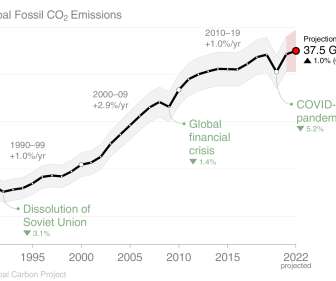Global Carbon Budget 2022: Global fossil CO2 emissions expected to grow 1.0% in 2022
Green Car Congress
NOVEMBER 14, 2022
Growth in oil use, particularly aviation, and coal use are behind most of the increase in 2022. Many countries, cities, companies, and individuals have made pledges to reduce emissions, and it is stark reminder that despite all this rhetoric, global fossil CO 2 emissions are more than 5% higher than in 2015, the year of the Paris Agreement.





















Let's personalize your content